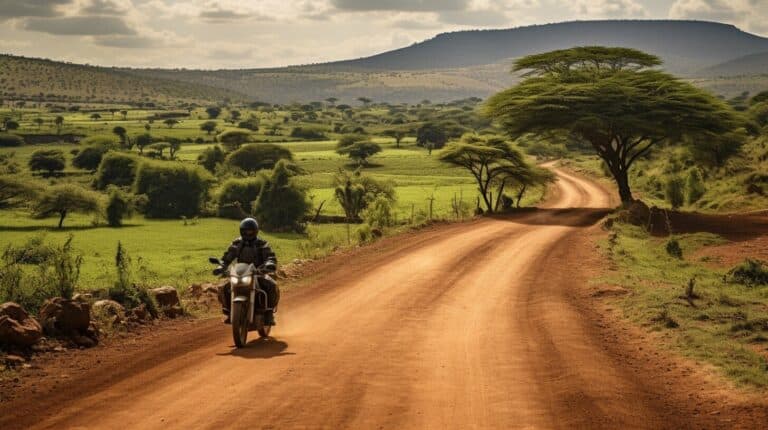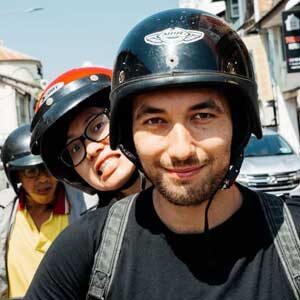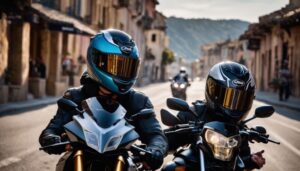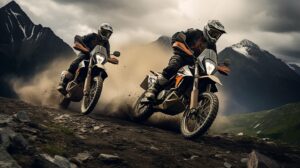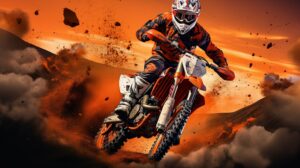Planning a motorcycle trip to Kenya? Make sure you’re well-prepared by following these 20 essential tips and laws. Kenya is a safe and exciting destination for motorcycle enthusiasts, but it’s important to be aware of the necessary precautions and regulations before embarking on your adventure.
Key Takeaways:
- Research the best time to visit Kenya based on your preferred activities, such as safaris, beaches, or hiking.
- Apply for a visa in advance and consider obtaining travel insurance to ensure a smooth entry and sufficient coverage for any emergencies.
- Consult with a healthcare professional to receive recommended vaccinations before traveling to Kenya.
- Pack appropriate clothing, documents, and equipment for your motorcycle trip, including a valid passport, driver’s license, and essential items like a camera and binoculars.
- Show respect for the local customs and etiquette, such as asking for permission before taking photos and being mindful of the local communities.
By familiarizing yourself with these tips and laws, you’ll be well-prepared to experience the stunning landscapes, diverse wildlife, and vibrant culture that Kenya has to offer on your motorcycle trip. Remember to prioritize safety, respect, and enjoyment throughout your journey. Happy travels!
Best Time to Visit Kenya for a Motorcycle Trip
The best time to go on a motorcycle trip in Kenya depends on what you want to experience – whether it’s wildlife encounters, beach relaxation, or thrilling adventures. Kenya offers diverse landscapes and activities, making it a popular destination for motorcycle enthusiasts.
If you’re interested in wildlife safaris, the dry seasons from January to March and July to October are ideal. During these months, the grass is shorter, making it easier to spot animals in the national parks. You can witness the Great Migration in Maasai Mara National Reserve from July to October, where thousands of wildebeests and zebras move between Kenya and Tanzania.
If you prefer the coastal region, the best time to visit is during the dry season from November to March. This is when you can enjoy the warm beaches, clear waters, and water sports like snorkeling and diving. The coastal towns of Mombasa and Malindi offer a vibrant mix of cultures and delicious cuisine influenced by Arabic, Indian, and Swahili flavors.
For adventure seekers, the months of June to September are perfect for hiking and trekking in Kenya. You can explore Mount Kenya, the second-highest mountain in Africa, or take on the challenging peaks of Mount Longonot and Mount Suswa. These months offer cooler temperatures and less rainfall, providing ideal conditions for outdoor activities.
In summary, the best time to visit Kenya for a motorcycle trip depends on the experiences you’re seeking. Plan your trip according to your preferences, whether it’s wildlife, beaches, or adventure, and ensure you check the weather conditions and pack accordingly. Kenya awaits with its breathtaking landscapes and unforgettable motorcycle adventures.
Entry Requirements: Visa and Travel Insurance
Before you hop on your motorcycle and head to Kenya, make sure you have the necessary documents in order – a valid visa and comprehensive travel insurance. A visa is a requirement for entry into Kenya, and it is recommended to apply online in advance to avoid any delays or complications upon arrival. The process is straightforward, and you can easily submit your visa application through the official eVisa website.
Travel insurance is highly recommended for your motorcycle trip in Kenya. While Kenya is generally a safe destination for travelers, accidents can happen, and having travel insurance provides you with peace of mind knowing that you are covered in case of any emergency treatment or medical evacuation. It is important to choose a travel insurance policy that covers motorcycle trips and offers adequate coverage for medical expenses, trip cancellation, and personal belongings.
It is also important to note that Kenya requires proof of a yellow fever vaccination for travelers coming from countries at risk of the disease. It is recommended to check the current vaccination requirements and consult with your healthcare provider before traveling. Additionally, vaccinations for diseases such as hepatitis A and B, and typhoid are strongly recommended to ensure your health and safety during your motorcycle trip in Kenya.
| Entry Requirements | Visa | Travel Insurance | Vaccinations |
|---|---|---|---|
| What is required? | A valid visa | Comprehensive travel insurance | Yellow fever, hepatitis A and B, typhoid (recommended) |
| How to obtain? | Apply online in advance | Purchase from a reputable insurance provider | Consult with your healthcare provider |
| Why is it important? | Required for entry | Provides coverage for emergencies | Protects your health and safety |
Before embarking on your motorcycle adventure in Kenya, make sure to have all the necessary entry requirements in order. Apply for your visa in advance, purchase comprehensive travel insurance, and ensure you have the recommended vaccinations. By taking these steps, you can enjoy a safe and worry-free motorcycle trip in Kenya while exploring the stunning landscapes and experiencing the vibrant culture.
Health and Safety Precautions
Ensuring your health and safety is paramount, so be sure to take the necessary precautions before embarking on your motorcycle adventure in Kenya. Here are some important tips to keep in mind:
1. Get the necessary vaccinations:
Prior to your trip, it is strongly recommended to consult with a healthcare professional to determine the required vaccinations for Kenya. Diseases such as yellow fever, hepatitis A and B, and typhoid are prevalent in certain areas, and vaccinations can provide protection against these illnesses.
2. Pack appropriate clothing:
Kenya has a diverse climate, so it’s important to pack clothing suitable for various weather conditions. Lightweight and breathable fabrics are ideal for hot and humid days, while warmer layers may be needed for cooler evenings or higher altitudes. Don’t forget to bring comfortable, closed-toe shoes for better protection during your rides.
3. Carry essential documents:
Make sure to have a valid passport and driver’s license with you at all times. It’s also wise to carry copies of important documents such as your passport, visa, and travel insurance. In case of any unforeseen circumstances, having these documents readily available can help expedite any necessary assistance.
4. Be mindful of local customs:
Respecting the local customs and traditions is essential when traveling in Kenya. In particular, always ask for permission before taking photos of people or their property. This shows cultural sensitivity and ensures that you have a positive interaction with the local communities you encounter on your journey.
| Important Vaccinations | Essential Clothing | Carry These Documents |
|---|---|---|
| Yellow fever | Lightweight and breathable fabrics | Valid passport and driver’s license |
| Hepatitis A and B | Warm layers for cooler evenings | Copies of passport, visa, and travel insurance |
| Typhoid | Comfortable, closed-toe shoes |
By taking these health and safety precautions, you can minimize any potential risks and ensure a smooth and enjoyable motorcycle trip in Kenya. Stay informed, be prepared, and have an incredible adventure exploring the stunning landscapes and diverse cultures of this beautiful country.
Packing Essentials for a Motorcycle Trip in Kenya
Packing smart is key to a successful motorcycle trip in Kenya – make sure you have all the essentials needed for a comfortable and enjoyable journey. Here is a handy packing list to help you prepare:
Clothing and Gear:
- Lightweight, breathable clothing for warm weather and layering options for cooler evenings
- Sturdy and comfortable closed-toe shoes or boots
- Protective riding gear including a helmet, gloves, and a jacket with armor
- Rain gear and a waterproof cover for your motorcycle
- A wide-brimmed hat or cap to shield you from the sun
Documents and Necessities:
- A valid passport with at least six months of validity remaining
- A valid driver’s license and motorcycle endorsement
- International driving permit (IDP) if required
- Travel insurance with coverage for medical emergencies and motorcycle accidents
- A copy of your travel itinerary and reservations
- Emergency contact numbers and addresses, including your embassy or consulate in Kenya
Essential Equipment:
- A reliable GPS or navigation system
- A camera or smartphone with a good quality camera for capturing memories
- Binoculars for wildlife viewing
- A compact first aid kit with basic medications
- A portable charger or power bank for keeping your devices charged
- A water bottle and travel mug for staying hydrated on the road
Additional Tips:
Remember to pack light and only bring what you truly need. Consider using packing cubes or compression bags to maximize space in your luggage. It’s also a good idea to carry some local currency for small purchases or emergencies.
By following this packing list and staying prepared, you’ll be ready to embark on an unforgettable motorcycle adventure in Kenya. Enjoy the stunning landscapes, encounter incredible wildlife, and immerse yourself in the rich culture and traditions of this beautiful country.
Understanding Local Customs and Etiquette
To fully immerse yourself in the Kenyan culture, it’s important to understand and respect the local customs and etiquette. Kenya is a country rich in cultural diversity, with over 40 different tribes each having their own unique customs and practices. Here are some key points to keep in mind:
Greetings and Respect
- When meeting someone for the first time, it is customary to greet them with a handshake and a polite “Jambo” (Hello) or “Habari” (How are you?).
- Always address people by their formal titles, such as “Mzee” for an elderly man or “Madam” for a woman.
- Show respect to elders by greeting them first and using the appropriate honorifics.
Dress Code
- Kenya is a conservative country, especially in rural areas, so it is important to dress modestly.
- Avoid wearing revealing or provocative clothing, especially when visiting religious sites or rural communities.
- When going on safari or outdoor activities, pack comfortable and lightweight clothing, and don’t forget a hat or cap to protect yourself from the sun.
Photography
- Always ask for permission before taking photographs of local people, especially in rural areas where people may be more traditional and may not appreciate being photographed without their consent.
- Respect any restrictions on photography in certain areas, such as wildlife reserves or cultural sites.
Cultural Sensitivity
- Respect local customs and traditions, such as removing your shoes before entering someone’s home or covering your shoulders when visiting religious sites.
- Use your right hand for greetings, eating, and giving/receiving items, as the left hand is considered unclean.
- Be sensitive to local taboos and avoid discussing topics such as politics, religion, or personal matters unless invited to do so.
| Tips | Laws |
|---|---|
| – Greet people with a handshake and a polite “Jambo” or “Habari” | – Dress modestly and respect local customs |
| – Ask for permission before taking photographs | – Use your right hand for greetings and eating |
| – Respect elders and address them with the appropriate honorifics | – Avoid discussing sensitive topics unless invited |
By understanding and respecting the local customs and etiquette, you will not only have a more meaningful cultural experience but also show appreciation for the Kenyan people and their way of life. Remember, a little cultural sensitivity goes a long way!
Bargaining and Tipping in Kenya
When it comes to shopping and dining in Kenya, knowing the art of bargaining and appropriate tipping practices can enhance your overall experience. Bargaining is a common practice in local markets, where prices are often negotiable. However, it’s important to find a balance and not over-haggle, as it is important to support local artisans and businesses. Engage in friendly negotiations, and remember that the goal is to reach a fair price that benefits both parties.
In restaurants and hotels, tipping is appreciated for good service. It is customary to leave a gratuity of around 10% to 15% of the bill. However, be sure to check if a service charge has already been included, as this is sometimes the case in upscale establishments. Additionally, if you receive exceptional service, you may want to consider giving a little extra to show your appreciation.
Being respectful of the local communities is crucial during your motorcycle trip in Kenya. Always ask for permission before taking photos of people, as some may be uncomfortable or have cultural beliefs against being photographed. Showing respect and understanding towards the local customs and traditions will create a more meaningful and enjoyable experience for both you and the local people.
Table: Bargaining and Tipping Guidelines
| Scenario | Bargaining | Tipping |
|---|---|---|
| Local Market | Negotiate with a friendly attitude | N/A |
| Restaurant | N/A | 10% to 15% of the bill |
| Exceptional Service | N/A | Consider giving a little extra |
By following these bargaining and tipping practices, you can contribute positively to the local economy while enjoying the unique shopping and dining experiences that Kenya has to offer. Remember to approach bargaining with a friendly mindset, and be respectful when tipping for good service. These small gestures can go a long way in creating lasting memories during your motorcycle trip in Kenya.
Emergency Preparedness
While we hope that your motorcycle trip in Kenya goes smoothly, it’s always wise to be prepared for emergencies. Here are some essential tips to ensure your safety during your adventure:
- Create a list of emergency contact numbers, including your embassy or consulate, local emergency services, and your travel insurance provider. Keep a printed copy with you and save the numbers on your phone for easy access.
- Carry important documents such as your passport, visa, and travel insurance information in a secure location. It’s a good idea to make digital copies and store them in a cloud storage service or email them to yourself.
- Learn basic first aid and CPR techniques before your trip. Knowing how to respond in an emergency can make a significant difference in saving lives.
- Research the nearest medical facilities along your planned route. Take note of hospitals, clinics, and pharmacies in case you need medical assistance.
- Ensure you have a well-stocked first aid kit with essential items like bandages, antiseptics, pain relievers, and any prescription medications you may need.
Table: Emergency Resources
| Emergency Contacts | Phone Number |
|---|---|
| Embassy or Consulate (Your Country) | +XXX-XXX-XXXX |
| Local Emergency Services | 999 |
| Travel Insurance Provider | +XXX-XXX-XXXX |
By following these emergency preparedness tips, you can have peace of mind and enjoy your motorcycle trip in Kenya to its fullest. Remember to prioritize your safety and well-being, and enjoy the breathtaking landscapes and unique experiences that Kenya has to offer.
Wildlife Encounters and Conservation Efforts
Kenya is renowned for its incredible wildlife, and as a responsible traveler, it’s essential to understand the importance of wildlife conservation. The country is home to a diverse range of animals, including elephants, lions, rhinos, and giraffes, among many others. However, these species face numerous threats, such as habitat loss, poaching, and human-wildlife conflict.
When embarking on a motorcycle trip in Kenya, it is important to do so in a way that minimizes disruption to wildlife and their natural habitats. Follow the guidelines set by national parks and reserves, and always stay on designated roads and tracks. Avoid approaching animals too closely, as this can cause stress and potentially dangerous situations.
Supporting conservation efforts is crucial to preserving Kenya’s wildlife for future generations. One way to contribute is by visiting conservancies and wildlife sanctuaries that focus on protecting endangered species and rehabilitating injured animals. These organizations often offer educational programs and guided tours, providing an opportunity to learn more about the challenges faced by wildlife in Kenya and the efforts being made to protect them.
The Importance of Sustainable Tourism
By choosing to support establishments that prioritize sustainable tourism practices, you can make a positive impact on wildlife conservation. Look for accommodations and tour operators that are eco-friendly and contribute to local conservation initiatives. These establishments may implement measures such as water and energy conservation, waste management, and community engagement programs.
Additionally, be mindful of your interactions with wildlife. Avoid activities that involve direct contact or exploitation of animals, such as riding elephants or visiting facilities that offer hands-on experiences with wild animals. Instead, opt for ethical wildlife experiences that prioritize the well-being and conservation of the animals.
Summary
When planning your motorcycle trip in Kenya, remember to prioritize wildlife conservation. Follow guidelines, stay on designated roads, and avoid disturbing wildlife. Support conservation efforts by visiting sanctuaries and conservancies, as well as choosing accommodations and tour operators that prioritize sustainability. Engage in ethical wildlife experiences and avoid activities that exploit or harm animals. By being responsible and mindful travelers, we can contribute to the protection of Kenya’s incredible wildlife for generations to come.
| Key Takeaways: |
|---|
| – Follow guidelines and stay on designated roads to minimize disruption to wildlife. |
| – Visit conservancies and wildlife sanctuaries that focus on protecting endangered species. |
| – Support sustainable tourism practices by choosing eco-friendly accommodations and tour operators. |
| – Engage in ethical wildlife experiences and avoid activities that exploit or harm animals. |
Exploring Kenya’s Scenic Routes
Get ready to be captivated by the breathtaking landscapes and diverse terrains as you embark on unforgettable motorcycle journeys through Kenya. With its rich wildlife, stunning national parks, and vibrant culture, Kenya offers a multitude of scenic routes that will leave you in awe. Whether you’re a nature lover, adventure seeker, or simply looking for a unique travel experience, these routes are sure to fulfill your wanderlust.
Aberdare Circuit
One of the most spectacular routes in Kenya, the Aberdare Circuit takes you through the scenic Aberdare National Park. As you wind your way through lush forests and rolling hills, keep an eye out for elephants, buffalos, and other wildlife that call this park home. This route is perfect for those seeking a thrilling off-road adventure and a chance to witness the beauty of the African wilderness.
The Great Rift Valley
Stretching from Ethiopia to Mozambique, the Great Rift Valley offers a mesmerizing landscape that is best explored by motorcycle. Ride along the valley’s edge and be treated to breathtaking views of volcanic mountains, sparkling lakes, and vast grasslands. This route is a true feast for the eyes, with opportunities to visit iconic destinations like Lake Nakuru National Park and Hell’s Gate National Park.
Coastal Road Trip
If sun, sand, and sea are what you’re after, a coastal road trip is a must. Start your journey in Mombasa and ride along the stunning Indian Ocean coastline, passing through picturesque towns and villages along the way. Enjoy the cool breeze as you soak up the sun on pristine beaches and indulge in delicious seafood. Don’t forget to make a stop at the enchanting Diani Beach, known for its turquoise waters and vibrant coral reefs.
| Route | Highlights |
|---|---|
| Aberdare Circuit | Aberdare National Park, wildlife sightings |
| The Great Rift Valley | Lake Nakuru National Park, Hell’s Gate National Park |
| Coastal Road Trip | Mombasa, Diani Beach, Indian Ocean coastline |
Cultural Experiences and Authentic Cuisine
Immerse yourself in the vibrant cultures of Kenya and treat your taste buds to the flavors of authentic Kenyan cuisine. Kenya is a melting pot of diverse ethnic groups, each with its own rich traditions and culinary delights. From the Maasai tribes to the Swahili coastal communities, the cultural tapestry of Kenya offers a unique experience for travelers.
One of the best ways to experience the local culture is through traditional music and dance. The rhythmic beats and energetic movements of the Maasai warriors will leave you captivated. Join in the festivities, learn traditional dances, and listen to the powerful chants that tell stories of bravery and heritage.
When it comes to food, Kenya’s cuisine is a delightful fusion of flavors influenced by the country’s diverse ethnic groups. Don’t miss out on trying Ugali, a staple dish made from maize flour, which is often served with sukuma wiki (collard greens) and nyama choma (grilled meat). For seafood lovers, the coastal region offers an abundance of freshly caught fish, prawns, and crab cooked in aromatic spices that will tantalize your taste buds.
To truly immerse yourself in the local culture, visit bustling markets and street vendors where you can sample traditional snacks like mandazi (deep-fried dough) and samosas filled with spiced meat or vegetables. Don’t forget to wash it all down with a cup of Kenyan tea or try the infamous local brew, chang’aa, made from fermented grains.
| Traditional Kenyan Dishes | Recommended Places to Try |
|---|---|
| Ugali with sukuma wiki and nyama choma | Nairobi Carnivore Restaurant |
| Pilau (spiced rice) with kachumbari | Mombasa Old Town |
| Chapati with stew | Nanyuki Town |
| Kenyan Tea | Masai Mara Game Reserve |
Experience the warmth and hospitality of the Kenyan people as they share their traditions, stories, and authentic cuisine. Each bite will transport you to a world of flavors, reflecting the rich heritage and cultural diversity of this beautiful country.
Are the Tips and Laws for a Motorcycle Trip in the UK Relevant for a Motorcycle Trip in Kenya?
When planning a motorcycle trip in Kenya, it’s important to consider if the tips for motorcycle trips in the uk are relevant. Factors such as road conditions, driving culture, and weather drastically differ between the two countries. While some aspects may overlap, it’s advisable to research specific advice for riding motorcycles in Kenya to ensure a safe and enjoyable trip.
Conclusion
By following these 20 tips and laws, you can ensure a safe, enjoyable, and memorable motorcycle adventure in the beautiful landscapes of Kenya.
Before embarking on a motorcycle trip in Kenya, it is important to be aware of several tips and laws. Kenya is a safe destination for tourists, but it is still important to exercise common-sense safety rules and be aware of your surroundings.
The best time to visit Kenya for a motorcycle trip depends on the purpose of the trip, whether it is for safari, beaches, or hiking. It is recommended to plan your trip during the dry season, which typically falls between June and October. This will ensure better road conditions and optimal wildlife viewing opportunities.
A visa is required for entry into Kenya, and it is recommended to apply online in advance. Travel insurance is highly recommended for emergency treatment and medical emergencies. Vaccinations for diseases such as yellow fever, hepatitis A and B, and typhoid are strongly recommended.
It is also important to pack appropriate clothing, including comfortable clothes and shoes, as well as essential items such as a valid passport and driver’s license, a camera, binoculars, and a wide-brimmed hat or cap. Additionally, it is crucial to be aware of the local customs and ask for permission before taking photos of people. Bargaining is common in markets, but it is important not to over-haggle. Tipping is appreciated in restaurants and hotels, and it is important to be respectful of the local communities.
Finally, it is important to know the emergency contact details of your embassy or consulate and to carry a copy of important documents such as your passport and visa. By being well-prepared and adhering to the rules and guidelines, you can have a fantastic motorcycle adventure in Kenya, exploring its breathtaking landscapes and enjoying its rich cultural experiences.
FAQ
Q: What are the important tips and laws to know before my motorcycle trip in Kenya?
A: Before embarking on a motorcycle trip in Kenya, it is important to exercise common-sense safety rules and be aware of your surroundings. It is also necessary to have a valid visa for entry into Kenya and to apply for it in advance online. Travel insurance is highly recommended for emergency treatment and medical emergencies. Vaccinations for diseases such as yellow fever, hepatitis A and B, and typhoid are strongly recommended. Additionally, it is important to pack appropriate clothing, including comfortable clothes and shoes, as well as essential items such as a valid passport and driver’s license, a camera, binoculars, and a wide-brimmed hat or cap. It is also important to be aware of the local customs and ask for permission before taking photos of people. Bargaining is common in markets, but it is important not to over-haggle. Tipping is appreciated in restaurants and hotels, and it is important to be respectful of the local communities. Lastly, make sure to know the emergency contact details of your embassy or consulate and carry a copy of important documents such as your passport and visa.
Q: What is the best time to visit Kenya for a motorcycle trip?
A: The best time to visit Kenya for a motorcycle trip depends on the purpose of the trip. If you are planning to go on a safari, the best time is during the dry season, which is from June to October. This is when the wildlife is more concentrated around water sources. If you are looking to enjoy Kenya’s beautiful beaches, the best time is from December to March, when the weather is hot and dry. For hiking, the best time is during the cooler months of July and August. It is recommended to check the weather and plan your trip accordingly.
Q: What are the entry requirements for a motorcycle trip in Kenya?
A: To enter Kenya for a motorcycle trip, you will need a valid visa. It is recommended to apply for the visa online in advance to avoid any delays at the border. Additionally, having travel insurance is highly recommended to cover any medical emergencies or unexpected situations during your trip.
Q: What are the health and safety precautions to take for a motorcycle trip in Kenya?
A: Before your motorcycle trip in Kenya, it is important to ensure that you have received the necessary vaccinations. Vaccines for diseases such as yellow fever, hepatitis A and B, and typhoid are strongly recommended. It is also important to pack appropriate clothing, including comfortable clothes and shoes, as well as sunscreen and insect repellent. While on the road, make sure to follow traffic rules, wear a helmet, and be aware of your surroundings. In case of any emergency, it is recommended to have travel insurance that covers medical emergencies.
Q: What should I pack for a motorcycle trip in Kenya?
A: When packing for a motorcycle trip in Kenya, it is important to have essential items such as a valid passport and driver’s license, a camera, binoculars, a wide-brimmed hat or cap, sunscreen, insect repellent, comfortable clothes and shoes, and a first aid kit. It is also recommended to pack a small backpack or saddlebags to carry your belongings while on the motorcycle. Make sure to pack according to the weather and activities you plan to engage in during your trip.
Q: What should I know about the local customs and etiquette in Kenya?
A: It is important to be aware of the local customs and etiquette in Kenya. Always ask for permission before taking photos of people, as some may find it disrespectful. Bargaining is common in markets, but it is important to be fair and not over-haggle. Tipping is appreciated in restaurants and hotels, usually around 10% of the bill. It is also important to be respectful of the local communities and their traditions. In general, showing politeness and kindness will go a long way in establishing positive interactions with the locals.
Q: What should I do in case of an emergency during my motorcycle trip in Kenya?
A: In case of an emergency during your motorcycle trip in Kenya, it is important to know the emergency contact details of your embassy or consulate. Make sure to have their contact information easily accessible. It is also recommended to carry a copy of important documents such as your passport and visa, and keep them in a safe place separate from the original documents. Having travel insurance with emergency assistance coverage can also be very helpful in case of any medical emergencies or unexpected situations.
Q: What are some of the scenic routes that I can explore during my motorcycle trip in Kenya?
A: Kenya offers a variety of scenic routes for motorcycle trips. Some popular routes include the Great Rift Valley, Mount Kenya region, Maasai Mara National Reserve, Amboseli National Park, and Lake Nakuru National Park. These routes provide breathtaking landscapes and opportunities to see wildlife in their natural habitats. It is important to plan your routes in advance and ensure that you have the necessary permits and permissions to access certain areas.
Q: What cultural experiences and authentic cuisine can I enjoy during my motorcycle trip in Kenya?
A: Kenya is rich in cultural experiences and offers a diverse range of authentic cuisine. During your motorcycle trip, you can visit traditional Maasai villages and learn about their customs and way of life. You can also explore the vibrant markets and try local dishes such as nyama choma (grilled meat), ugali (a staple food made from maize flour), and chapati (flattened bread). Additionally, Kenya is known for its coffee and tea, so make sure to indulge in a cup of freshly brewed Kenyan coffee or tea during your trip.

